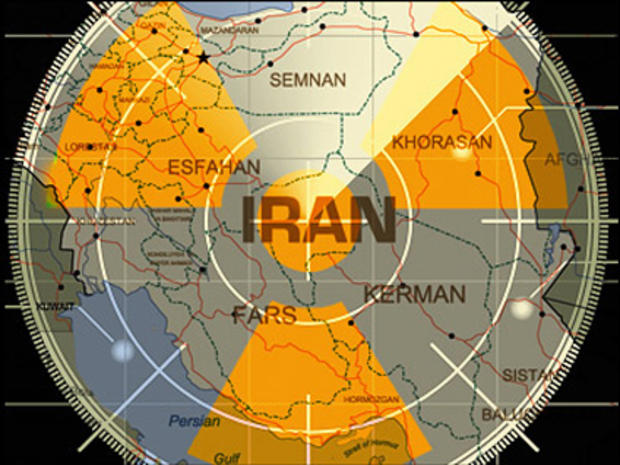Report: Iran able to arm nuclear bomb more quickly
A respected U.S. think tank now believes that Iran could produce enough weapons-grade uranium to arm a nuclear bomb in less than two months but could still face a "substantial" amount of additional time to make a "reliable" warhead for a nuclear missile.
A year ago, the Institute for Science and International Security estimated that Iran could arm a nuclear weapon within two to four months. The group reported its latest findings (PDF) Thursday.
Meanwhile, in Vienna, experts with the U.N.'s nuclear agency are looking to investigate suspicions that Iran for years worked secretly on developing a nuclear weapons program. Iran has no nuclear arms and denies such work, saying all its atomic activities are peaceful.
In one scenario, ISIS estimated that Iran could make 25 kilograms (about 55 pounds) of weapons-grade uranium, which it calls a single "significant quantity," within about a month to just over a month and a half, according to the group's summary report.
Following that course would require Iran to use its entire stockpile of uranium near 20 percent enrichment. Uranium enriched to 20 percent can be turned into weapons-grade material much more quickly than low-enriched uranium.
A different scenario using all of Iran's uranium at 3.5 percent enrichment pushes the amount of necessary time to within just under two months to just over two months. The group estimates that following that course would produce four significant quantities of weapons-grade uranium.
The group didn't include estimates for converting weapons-grade uranium into the components needed to make a nuclear weapon except for noting that the amount of necessary time could be "substantial," "particularly if Iran wanted to build a reliable warhead for a ballistic missile."
The summary report suggests that if Iran makes it past the enrichment process then it might be too late to stop its suspected weapons program.
"If Iran successfully produced enough [weapons-grade uranium] for a nuclear weapon, the ensuing weaponization process might not be detectable until Iran tested its nuclear device underground or otherwise revealed its acquisition of nuclear weapons," read the summary report. "Therefore, the most practical strategy to prevent Iran from obtaining nuclear weapons is to prevent it from accumulating sufficient nuclear explosive material, particularly in secret or without adequate warning."
A top nuclear negotiator from Tehran will meet with the head of the International Atomic Energy Agency next week just hours before agency experts sit down with Iranian counterparts to renew their push for access to sites, people and documents believed linked to possible work on atomic arms, the agency said Thursday.
The talks between IAEA specialists and Iranian negotiators have been set for nearly a month. But Iran's decision to send Deputy Foreign Minister Abbas Araghchi was only announced Thursday.
Araghchi's mission in Vienna was unclear, but he played a key role in nuclear talks last week with six world powers that negotiators from both sides described as encouraging after years of inconclusive meetings. Those talks in Geneva were focused on limiting Iranian nuclear programs that can be used both to generate power and make fissile warhead material.
A new round is scheduled Nov. 7-8. While the two talks are formally separate, they are linked by concerns over Iran's nuclear aspirations, and progress in one may result in advances in the other.
The IAEA, in an email to The Associated Press, said Araghchi will meet with agency chief Yukiya Amano on Monday afternoon for about an hour. Two hours later, agency officials seeking to restart their probe of suspicions that Tehran worked on the bomb will meet with Iranian officials, the IAEA said.
The Vienna talks have been deadlocked for nearly two years, with agency experts seeking an open-ended probe and Iran insisting that it be carefully scripted. But officials from both sides spoke of a "constructive" meeting after the latest round last month. That assessment and reports of progress in Geneva are both seen as encouraging tests of pledges by Hassan Rouhani, Iran's new centrist president, to reduce nuclear tensions.
As part of its probe, the agency is trying to gain access to a sector at Parchin, a sprawling military establishment southeast of Tehran. The agency suspects the site may have been used to test conventional explosive triggers meant to set off a nuclear blast.
Amano told reporters earlier this year he was concerned about satellite images showing asphalt work, soil removal and "possible dismantling of infrastructures" at the site.
Iran says such activities are part of regular construction that has nothing to do with alleged attempts to cleanse the area of evidence. But Amano said that because of such activities, "it may no longer be possible to find anything even if we have access to the site."
